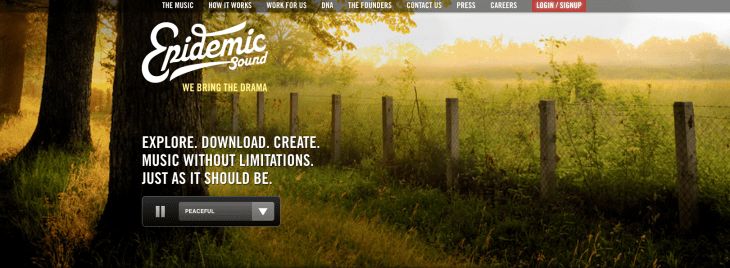Swedish startup Epidemic Sound, founded back in 2009 with the idea of taking the hassle out of music licensing for broadcasters and online video producers by building a library of songs it wholly owns, has taken in its first tranche of institutional funding from Nordics VC Creandum — with a $5 million Series A.
Prior to this the company had been bootstrapping its business, growing to “thousands” of customers including a majority of TV broadcasters in Northern Europe, such as TV4 and SVT in Sweden; YLE and MTV3 in Finland; TV2 and Discovery in Norway; RTL Nederland in Holland; and Channel5/Viacom in the U.K. It has also recently launched co-operations with multi channel networks (MCNs) include Disney’s Maker Studios in the U.S. and Mediakraft in Germany.
Epidemic Sound says it will be using a portion of the new Series A funding to pay more composers to create new tracks for its library. The funds will also be used to hire additional people to staff out recently opened operations in Holland, Germany, the U.K. and U.S. — with a focus on hiring in from the broadcast and production industries it’s targeting.
The founding premise of the business is to reduce the licensing complexity of music rights management for production music (i.e. music used in professional TV and online visual content production) — and to disrupt the business of the traditional production music libraries, such as Universal, Sony, BMG, EMI and Warner. The startup is betting that as visual content continues to expand out from local linear TV to streaming online globally, across a proliferation of device types, the demands of the industry for increasingly simple licensing will also only increase.
Epidemic Sound achieves low-friction licensing — lower, it argues, than its traditional rivals — by buying outright all the music in its library, paying its composers an average of $500 per track. That model gives its composers a guaranteed income, since tracks are paid for even if they are not used in any broadcasts.
Since the startup wholly owns all the music, it can then offer simple, non-exclusive licensing to its customers. The only exception to the free, non-exclusive use of its tracks is for vignettes (program theme songs) or in-channel graphics (channel idents). For those users, customers must enter a separate agreement — meaning composers of sounds used in those scenarios will receive larger payments.
It also offers tracks split into instrument STEMS, so it’s customers can tweak the sound files further via editing. The startup says it has more than 30,000 tracks in its library, created by more than 200 composers, who were selected from 5,000 applicants.
Broadcasters generally pay a monthly subscription fee that ranges from thousands to hundreds of thousands of dollars for unlimited use of Epidemic Sound’s library. While video content creators in Europe and the U.S. are able to get access to the library either through broadcasters, trade organizations or multichannel networks they belong to or are making content for.
Plus it’s also targeting individual online content creators/independent filmmakers via the Epidemic Sound Track Shop on its website — offering individuals the ability to license music from its catalogue for $1.50 per second.
While there are free/creative commons sound libraries online, which offer some free competition to Epidemic Sound, it argues it competes favorably against fee-less competition by generally offering higher quality music and by enabling commercial use of it — which isn’t always the case with creative commons music. Plus, it also says it’s offering customers peace of mind that they are covered in all potential licensing scenarios, and won’t receive any surprise take-down requests.
Commenting on the funding round in a statement, Creandum General Partner Staffan Helgesson, said: “Epidemic Sound fixes a huge problem for any video producer – from national broadcasters to YouTube’s largest MCNs – whose content is watched online around the world on a variety of devices. There will always be times when you want that song by a popular artist, but for the vast majority of music used in professional productions, the Epidemic Sound method can radically change how music will be licensed.”
